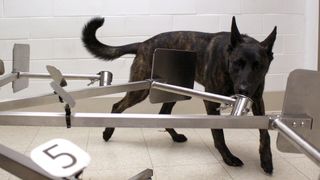Dogs are being trained to sniff out COVID-19 in humans

Scientists are training dogs to identify COVID-19 by following their noses.
A new program at the University of Pennsylvania's School of Veterinary Medicine (Penn Vet) is putting noses to the grindstone for disease detection. Researchers are working with dogs to see if the canines' superior sniffers can help with early detection of COVID-19 in humans.
Dogs that can pinpoint the scent of COVID-19 could identify infection in people who are asymptomatic, and could play a valuable role in disease response as people return to work and social-distancing restrictions are relaxed, Penn Vet representatives said in a statement.
Related: Coronavirus outbreak: Live updates
Reports of dogs sniffing out cancer have been documented since the 1980s, Live Science previously reported. Many cells produce volatile organic compounds (VOCs) that have distinctive odors and are present "in human blood, saliva, urine or breath," Cynthia Otto, a doctor of veterinary medicine and a director of Penn Vet's Working Dog Center, said in the statement.
Studies have shown that the smell of VOCs released by cancerous cells is unique enough that dogs' sensitive noses — which have up to 300 million scent detectors, compared with around 6 million in people — can spot the presence of cancer cells amid healthy ones; in fact, most dogs can be trained in about six months to identify the smell of a specific cancer. That same ability could enable dogs to identify disease caused by the novel coronavirus.
In the Penn Vet program, eight dogs will initially be trained in a laboratory setting. Over three weeks, they will first learn to recognize the smell of COVID-19 in saliva and urine samples from infected patients, through a technique known as odor imprinting, according to another Penn Vet statement. The dogs will then be tasked with differentiating between those samples and samples collected from people who do not have the disease.
"The potential impact of these dogs and their capacity to detect COVID-19 could be substantial," Otto said. "This study will harness the dog's extraordinary ability to support the nation's COVID-19 surveillance systems, with the goal of reducing community spread."
But could exposure to COVID-19 pose a threat to the dogs? In March, a pet dog in Hong Kong tested positive for COVID-19, and experts suspected that it had caught the disease from its infected owner, Live Science reported. This is thought to be the first example of human-to-animal transmission of COVID-19.
However, some experts were doubtful about the dog's diagnosis. Initially, the animal did not receive a blood test that would have confirmed the presence of coronavirus antibodies created to fight off the infection, and a blood test that was performed later did not find any coronavirus antibodies, Live Science reported.
Then again, it's possible that the dog experienced a mild immune response to COVID-19 that did not require the production of specific antibodies. Another dog, a pug in North Carolina, also tested positive for COVID-19 after likely catching it from its owners, Time reported on April 28.
Trained dogs could be ready to start sniffing out COVID-19 in humans by July, according to the Penn Vet statement.
-- Sent from my Linux system.



No comments:
Post a Comment